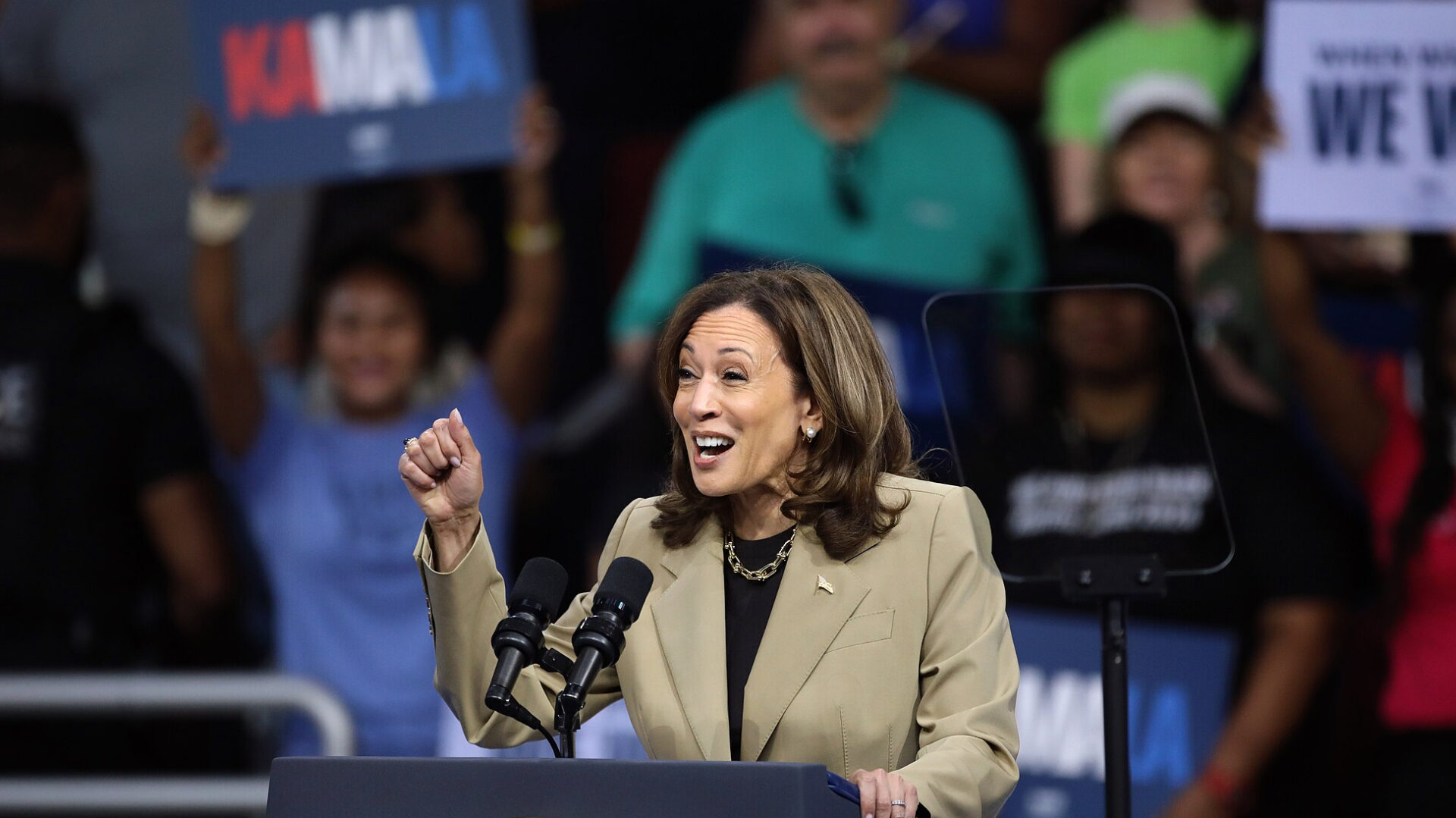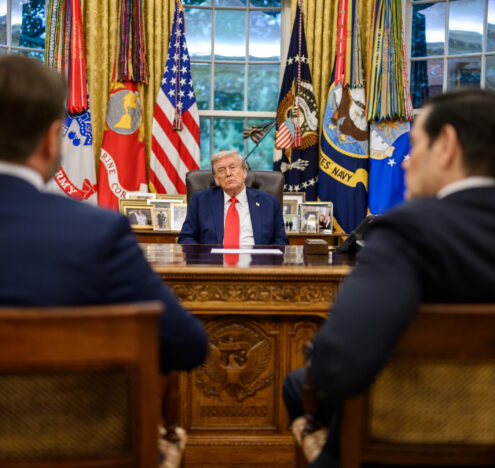Former President Barack Obama once said, “If more women were put in charge, there would be less war.” In this election, Kamala Harris could become the first woman president of the United States. Some 58% of likely women voters support her. A Harris presidency would represent historic progress for women, but would it necessarily mean a more peaceful United States?
Not only does the research actually contradict the “women as peacemakers” argument, but the assumption that women are inherently peaceful is an argument that portrays women as a homogenous group with little differentiation in experiences, failing to address the real problem: the patriarchal hierarchies built into state security institutions.
This issue is especially prevalent in the world of nuclear policy and the existential threat of nuclear weapons. While the presidential candidates are not specifically talking about nuclear weapons on the campaign trail, the future of US nuclear strategy is on the table yet again as proponents of the Trump administration’s policies advocate for developing new tactical and low-yield nuclear weapons, representing a desire to adapt to the changing global order and a potential break from previous US strategy.
Bolstering women in positions of power is important for the sake of gender parity. Still, elevating a woman’s role in nuclear strategy and decision-making alone will not guarantee peace. We must consider additional factors, including environmental impacts and human psychological and physiological health, in discussions about the nuclear industry and strategy. We should then place continuous pressure on leaders of all genders to shift the focus to human well-being in their decision making.
Gender Perspectives in Nuclear Nonproliferation
Some believe that, based on the gendered impact of nuclear fallout, women have more of a motivation for the advocacy of nuclear nonproliferation. For example, women have a higher risk of solid cancers due to nuclear fallout exposure and would disproportionately face the brunt of psychological trauma.
Women have also been some of the most notable protesters of the bomb. Most famously, women held hands in a nine-mile perimeter circling Greenham Common in the United Kingdom to protest the nuclear missiles stored there. Women’s groups also successfully advocated for a Treaty on the Prohibition of Nuclear Weapons, the first international agreement to prohibit and eventually eliminate nuclear weapons.
Despite this history of women’s advocacy in matters of nuclear nonproliferation and the disproportionate effects of nuclear fallout on women, according to the United Nations Institute for Disarmament Research, women make up 34% of participants in arms control and disarmament deliberations.
Women: Hawks or Doves?
While it is true that in some cases, surveys show that women are less supportive of war than, a 2017 Stanford survey about American public opinion on nuclear weapons found that “women are as hawkish as men and, in some scenarios, are even more willing to support the use of nuclear weapons” when it comes to protecting American troops.
Harris’s speech at the Democratic National Convention showcased this sentiment: “As commander in chief, I will ensure America always has the strongest, most lethal fighting force in the world. And I will fulfill our sacred obligation to care for our troops and their families, and I will always honor and never disparage their service and their sacrifice.”
The choice to use the word “lethal” is particularly interesting, as lethality — causing death, in other words — does not equal efficiency. In fact, it is the military’s responsibility to exert their force proportionally, with as little lethality as possible when completing their mission.
Stereotypes and Consequences
Gender stereotypes influence voters to rank male candidates higher for handling policy issues of war or the economy while ranking female candidates as better able to handle areas of “compassion” like education, health, and homelessness.
That’s why many have pointed out that female politicians may adopt more hawkish policies to be taken seriously in certain policy areas, and that voters are more likely to elect women with hawkish ideologies. For example, research has shown that women executives tend to raise defense budgets by around 3%.
The choice to use the word ‘lethal’ is particularly interesting, as lethality — causing death, in other words — does not equal efficiency.
Madeleine Albright, Hillary Clinton, and Jeane Kirkpatrick are all examples of women who made it to top levels of government in foreign policy but did not demonstrate what many consider dovish behavior.
Kirkpatrick, for instance, saw “the defense of American national interests, rather than an abstract concept like rational humanism, as the appropriate raison-d’être of foreign policy,” according to academic Silvia Bashevkin.
Seeking credibility in, more specifically, the nuclear space, women tend to adopt a “technostrategic” language that does not allow for the consideration of human impacts under the false assumption that emotion gets in the way of rationality. Women have noted that focusing on humanitarian factors leads to not being taken seriously.
Nuclear Policy under a Potential Harris Presidency
The Biden-Harris Administration maintained a track record of holding nuclear weapons as a central priority in its military strategy, rejecting policies of no-first-use of nuclear weapons, and ordering the Air Force to work on decreasing the amount of time it would take to upload ICBMs in the event of a presidential order.
However, it’s unclear whether a Harris-Walz administration would hold the same policies. In 2019, when asked about supporting a no-first-use policy, Harris did not respond directly to the question but acknowledged the threat of nuclear weapons, citing her experience on the Senate Intelligence Committee. She instead focused on the question of the Iran nuclear deal, saying: “This president [Donald Trump], because he likes to sound tough as opposed to what my mother says — ‘It’s not about how you sound, it’s about how you act.’ — pulls us out of that [Iran Nuclear Deal], exposing us to great harm.”
In her statement, she unintentionally demonstrated how masculine coded traits dominate in foreign policy and nuclear strategy. She strikes at the false “toughness” Trump displayed in his policy, and hints that she would act in a tougher way.
More recently, in her speech at the 2024 Democratic National Convention, Harris demonstrated how she would be tougher on dictators like Kim Jon-Un, contrasting Trump’s move to publicly meet with the North Korean Dictator. Trump’s response was to attack her credibility, tweeting: “There will be no future under Comrade Kamala Harris, because she will take us into a Nuclear World War III! She will never be respected by the Tyrants of the World!”
Trump didn’t elaborate about why Harris, in his view, wouldn’t garner respect, but it couldn’t be because she’s a woman, could it?
“Add Women and Stir”
Increasing the amount of women in the room — the “add women and stir” approach — will not change how policymakers think about nuclear security. A Harris presidency will not guarantee a shift against the use of nuclear weapons. However, her presidency could offer a window of opportunity. With immigrant parents coming from Jamaica and India, Harris’s background may allow her to understand a wider international perspective that could help her push for diplomatic arms control solutions, and her lived experiences as a woman may make her more empathetic to the indiscriminate humanitarian impacts of nuclear fallout.
While having women in decision-making roles increases the probability of diverse perspectives and new policies, it does not guarantee a shift in the status quo or a preference for dovish policy. After all, women will still have to fit into and adapt to existing hierarchies that govern nuclear policy. Those structures must change as well for leaders of all genders to be able to implement new nuclear policy with consideration of humanitarian impacts.




















